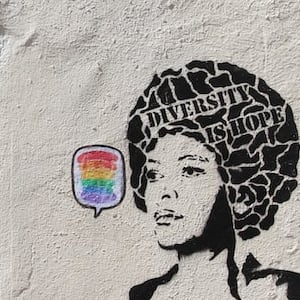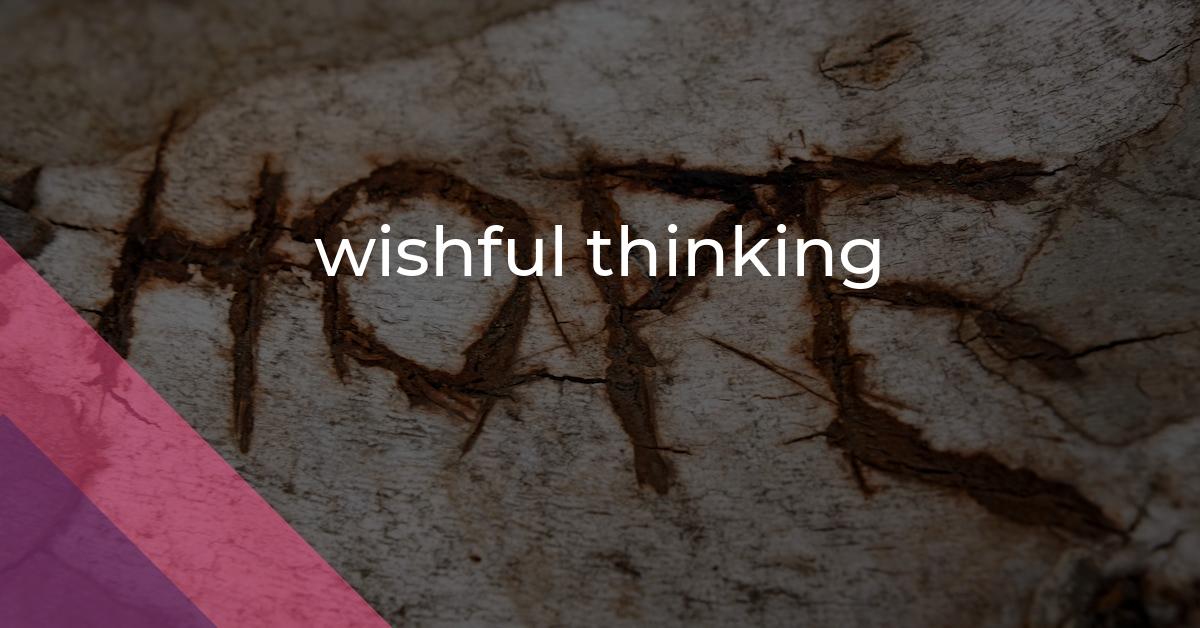wishful thinking: Idiom Meaning and Origin
What does ‘wishful thinking’ mean?
The idiom wishful thinking refers to the act of continuing to hope for or believe in something that is highly unlikely to happen. It implies a sense of unrealistic optimism or a refusal to accept the reality of a situation.

Idiom Explorer
"You wish" is an idiom used sarcastically to express disbelief or to dismiss someone's desire as unrealistic or unlikely to happen.
The idiom "touch wood" is used to express a hope that something will continue to be successful or positive. It is often accompanied by a superstitious action of physically touching or knocking on wood.
An idiom meaning an unrealistic or unattainable desire/expectation, often used to convey someone wanting something that is impossible to obtain.
The idiom "suspend one's disbelief" means to temporarily accept something as true or real, even though it may be unlikely or not based in reality.
The idiom "rainbows and unicorns" is used to describe a situation or perspective that is overly optimistic, idealistic, or lacking in realism.
A pipe dream is an unrealistic or impractical idea or plan. It refers to a dream or ambition that is unlikely to come true, similar to a mirage or an illusion.
The idiom "pie-in-the-sky" refers to something that is unrealistic or unlikely to happen. It describes a situation or idea that may seem appealing or enticing, but is not practical or achievable in reality.
The idiom "pie in the sky" means something that is unrealistic or unlikely to happen. It refers to a promise or idea that sounds good but is not practical or achievable.
The idiom "monkey's paw" refers to a metaphorical object that brings about unintended consequences or misfortune when one wishes for something. It symbolizes the idea that one should be careful what they wish for, as the outcome may not be as desirable as initially thought.
The Power of Optimistic Illusions
Wishful thinking is an idiom used to convey the idea of having a hopeful or optimistic outlook that is not based on realistic expectations. The phrase suggests the act of indulging in a desire or hope that is unlikely to come true. The idiom "I wish" is closely related to wishful thinking, as it is an expression used to convey a longing or desire for something that is not currently possible or realistic. Similarly, the idiom "you wish" is often used to sarcastically imply that someone's desire or hope is unlikely or unrealistic.
The term "wishful thinking" has been in use since at least the 1870s and is commonly used in both formal and informal contexts. It gained popularity in the late 19th century and early 20th century, and is often used in a negative context to criticize individuals for their unrealistic expectations or for believing in something that is highly unlikely to occur. The phrase is also commonly used to describe the act of relying on wishful thinking as a coping mechanism in difficult or uncertain situations.
One possible origin of the phrase can be traced back to the writings of Thomas Hobbes, an English philosopher, who used a similar expression in his book "Leviathan" published in 1651. Hobbes used the term "wishful thinking" to refer to the tendency of individuals to confuse their desires with reality, leading to distorted judgments and irrational behavior. However, there is no evidence to suggest a direct connection between Hobbes' usage and the contemporary idiom.
Wishful thinking is a natural tendency for individuals to engage in, as it offers a form of solace or escape from harsh realities. It allows people to momentarily envision a more desirable outcome, regardless of how improbable it may be. In personal relationships, the idiom can refer to the hopeful but unrealistic expectations that individuals may have about their partners or the future of their relationship. The idiom "I wish" can be used in conversations to express these hopeful but unrealistic desires.
Similarly, in politics, wishful thinking is frequently used to critique politicians who make promises or propose policies that are unlikely to be realized. The idiom "you wish" is often used sarcastically in these situations to highlight the unrealistic nature of these promises. Wishful thinking can have both positive and negative effects. On one hand, it can provide individuals with a sense of optimism and hope, which may act as a motivational force. It can inspire people to work towards their goals and strive for positive change.
However, relying solely on wishful thinking can be detrimental, as it may prevent individuals from acknowledging and addressing the reality of a situation. It can lead to disappointment, frustration, and a lack of progress. The idiom "you wish" is often used to humorously dismiss or undermine someone's unrealistic hopes or expectations. It serves as a reminder to approach situations with a level-headed perspective and to consider the feasibility of our desires.
Overall, wishful thinking is a common human tendency, and the idiom "wishful thinking" is frequently used to criticize unrealistic expectations or the reliance on fantasies. The related idioms "I wish" and "you wish" are often used in conversations to express hopeful desires and to sarcastically dismiss unrealistic hopes. The idiom reminds us of the delicate balance between hope and reality and encourages us to approach situations with a level-headed perspective.
Example usage
Examples of how the idiom "wishful thinking" can be used in a sentence:
- He hoped that his team would win the championship, but it was just wishful thinking.
- Believing that everything will magically fall into place without putting in any effort is simply wishful thinking.
- She kept dreaming of a perfect vacation, but it was nothing more than wishful thinking due to her busy schedule.
More "Delusion" idioms
We missed the mark - nothing found.



